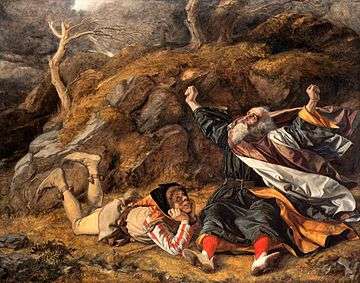Lear (opera)
| Aribert Reimann |
|---|
 |
|
Operas
|
Lear is an opera in two parts with music by the German composer Aribert Reimann, and a libretto by Claus H. Henneberg, based on Shakespeare's tragedy King Lear.
Background and performance history
Reimann wrote the title role specifically for the baritone Dietrich Fischer-Dieskau, who had suggested the subject to the composer as early as 1968. Reimann then received a commission from the Bavarian State Opera in 1975. The world premiere, in a production by Jean-Pierre Ponnelle with Fischer-Dieskau in the title role, occurred at the National Theatre Munich on 9 July 1978, with Gerd Albrecht conducting.[1]
The production was revived in Munich in 1980.[2] The US premiere, in English translation, was presented by the San Francisco Opera in June 1981, with Thomas Stewart as Lear, under Gerd Albrecht.[3][4] The Paris premiere took place in November 1982, in a French translation by Antoinette Becker.[5] The UK premiere was presented by English National Opera in 1989.,[1] while the Swedish premiere took place at the Malmö Opera and Music Theatre on 27 April 2013.
Roles
One notable departure from operatic convention was to make the part of Lear's Fool a speaking role, rather than a sung role. In addition, compared to the Shakespeare original, the parts of Kent and Edmund, for example, have been greatly reduced.[1]
| Role[6] | Voice type[6] | Premiere cast 9 July 1978[7] (Conductor: Gerd Albrecht) |
|---|---|---|
| Lear | baritone | Dietrich Fischer-Dieskau |
| Fool | spoken role | Rolf Boysen |
| Goneril, daughter of Lear | dramatic soprano | Helga Dernesch |
| Regan, daughter of Lear | soprano | Colette Lorand |
| Cordelia, daughter of Lear | soprano | Júlia Várady |
| Duke of Albany | baritone | Hans Wilbrink |
| Duke of Cornwall | tenor | Georg Paskuda |
| King of France | bass-baritone | Karl Helm |
| Duke of Gloucester | bass-baritone | Hans Günter Nöcker |
| Edgar, son of Gloucester | tenor/countertenor | David Knutson |
| Edmund, illegitimate son of Gloucester | tenor | Werner Götz |
| Earl of Kent | tenor | Richard Holm |
| Servant | tenor | Markus Goritzki |
| Knight | spoken role | Gerhard Auer |
| Chorus: servants, guards, soldiers, Lear's and Gloucester's retinue | ||
Instrumentation
The orchestral score requires:[6]
- 3 flutes (all doubling piccolo), alto flute, bass flute, 3 oboes, English horn, 2 clarinets, bass clarinet, 2 bassoons, contra-bassoon
- 6 horns, 4 trumpets, 3 trombones, tuba
- percussion6, 2 harps
- strings: 24 violins, 10 violas, 8 violoncellos, 6 double basses
Recordings
- 1978: Dietrich Fischer-Dieskau, Karl Helm, Hans Wilbrink, Georg Paskuda, Richard Holm, Hans Günter Nöcker, David Knutson, Werner Götz, Helga Dernesch, Colette Lorand, Júlia Várady, Rolf Boysen, Markus Gortizki, Gerhard Auer; Bavarian State Orchestra, Chorus of the Bavarian State Opera; Gerd Albrecht, conductor. Deutsche Grammophon 463 480-2 (CD reissue)[8][9]
- 2008: Wolfgang Koch, Magnus Baldvinsson, Dietrich Volle, Michael McCown, Hans-Jürgen Lazar, Johannes Martin Kränzle, Martin Wölfel, Frank van Aken, Jeanne-Michèle Charbonnet, Caroline Whisnant, Britta Stallmeister; Frankfurter Opern- und Museumsorchester, Chorus of the Frankfurt Opera, Sebastian Weigle, conductor. Oehms classics OC 921[10]
References
Notes
- 1 2 3 Graeme, Roland (2001). "Lear. Aribert Reimann". The Opera Quarterly. 17 (1): 158–161. doi:10.1093/oq/17.1.158. Retrieved 2007-09-06.
- ↑ Marker, Frederick J., "Theatre in Review: Lear (Aribert Reimann)" (March 1981). Theatre Journal, 33 (1): pp. 112–114.
- ↑ John Rockwell (17 June 1981). "Lear by Aribert Reimann". New York Times. Retrieved 2007-09-06.
- ↑ Michael Walsh (29 June 1981). "Three Premieres, Three Hits". Time. Retrieved 2007-09-13.
- ↑ Lieblein, Leanore, "Theatre Review" (Périclès, Prince de Tyr / Lear) (May 1983). Theatre Journal, 35 (2): pp. 262–263.
- 1 2 3 "Aribert Reimann – Lear". Schott Music. Retrieved 9 October 2010.
- ↑ Casaglia, Gherardo (2005).[http://www.amadeusonline.net/almanacco?r=&alm_giorno=09&alm_mese=07&alm_anno=1978&alm_testo=Lear "Lear, 9 July 1978"]. Almanacco Amadeus (Italian).
- ↑ Griffiths, Paul, Review: "Reimann. Lear" (1980). The Musical Times, 121 (1644): p. 107.
- ↑ "On-line catalogue entry Reimann – Lear - Albrecht". Deutsche Grammophon. Retrieved 9 October 2010.
- ↑ "On-line catalogue entry Aribert Reimann – Lear". Oehms Classics. Retrieved 9 October 2010.
Sources
- Holden, Amanda (Ed.), The New Penguin Opera Guide, New York: Penguin Putnam, 2001. ISBN 0-14-029312-4
